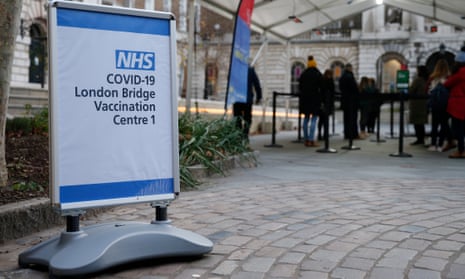More than 500,000 people who have been vaccinated against Covid-19 will have their second dose delayed for up to 12 weeks as the NHS rethinks the rollout that is aimed at halting the surging death toll in the UK.
In a change of policy, applying across the UK, the NHS will now prioritise administering to as many people on the priority list as possible the first dose of either the newly approved Oxford/AstraZeneca vaccine or the Pfizer/BioNTech jab, so as to maximise the number of people protected against the disease.
Recipients will still get the two doses required to confer full immunity, but now the second will be delayed, in most cases coming 11 to 12 weeks after the first.
Previously, those receiving the Pfizer jab had a second dose-date set three weeks later on from their first dose. That gap was originally expected to be four weeks for the Oxford vaccination.
Sir Simon Stevens, chief executive of NHS England, disclosed the move in a letter to health service leaders in England on Wednesday, a day on which 981 more Covid deaths were announced. The move has been prompted by the Medicines and Healthcare products Regulatory Authority changing its guidance on how the vaccines can be deployed.
He also disclosed that the NHS hoped to have immunised all 25 million people in its nine priority groups by late spring, the first time any NHS leader or government minister has given a date for when those considered vulnerable will have had the chance to be vaccinated.
Dr Julia Patterson, the lead for EveryDoctor, a network of grassroots medics, said: “This sudden change of plan from the government will heap enormous pressure on the NHS staff delivering vaccines, and will also cause anxiety for vulnerable people who have had a first dose of vaccine and now face uncertainty about when they will receive their second dose.
“The government should be swiftly recruiting an additional mass workforce to roll out the vaccines, for example by enlisting the army, and not simply load further pressure on to NHS staff.”
The shift to delayed second doses means most of the many hundreds of thousands of people in England who have received their first jab, following use of the Pfizer product begun in the UK on 8 December, will now have to wait until as late as March for the second.
The chief medical officers of the four home nations have approved the policy switch amid a growing expectation that the daily death toll will soon exceed 1,000, given the explosion in infections and hospitalisations in recent weeks.
There is also acute concern that the NHS is being rapidly overwhelmed by the number of people now seriously ill in hospital, especially in the south of England. Buckinghamshire followed Essex on Wednesday by declaring a “major incident” in response to soaring Covid-19 cases.
Explaining the rationale for the change, the chief medical officers said in a statement, quoted by Stevens in his letter: “Prioritising the first doses of vaccine for as many people as possible on the priority list will protect the greatest number of at-risk people overall in the shortest possible time and will have the greatest impact on reducing mortality, severe disease and hospitalisations and in protecting the NHS and equivalent health services.
“Operationally this will means that second doses of both vaccines will be administered towards the end of the recommended vaccine dosing schedule of 12 weeks.”
In his letter Stevens makes clear that:
Anyone who is due to have their second dose by next Monday can still do so.
Appointment dates for those whose second dose is due after 4 January “should be rescheduled in most instances for between three [weeks’] (for the Pfizer/BioNTech vaccine) and four [weeks’] (for the AstraZeneca vaccine) and 12 weeks’ time, with most recipients to be booked in the last week of that 12-week period”.
Those who are due to have their first jab from New Year’s Eve onwards should also not have their second dose until up to 12 weeks later. “Most recipients to be booked in the last week of that 12-week period.”
In a move that will be warmly welcomed by NHS staff, Stevens also confirmed that the imminent arrival of the Oxford vaccine – which will start being deployed on Monday – means staff immunisations can start right away.
Hospital and GP leaders, and frontline staff, have become increasingly vocal in recent weeks in airing their concern that leaving NHS personnel unvaccinated could expose both them and patients to danger at a time when the coronavirus is still rampant.
